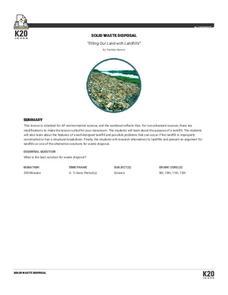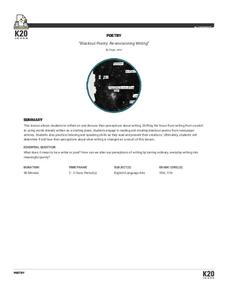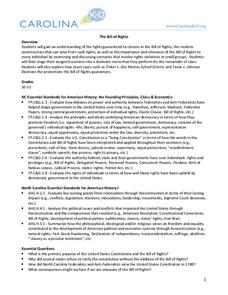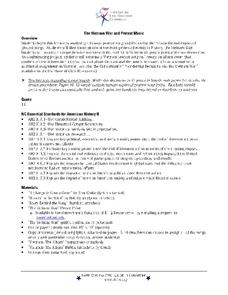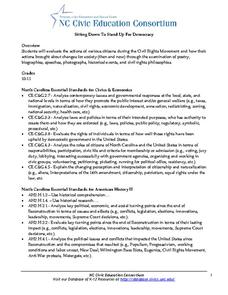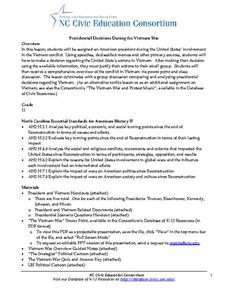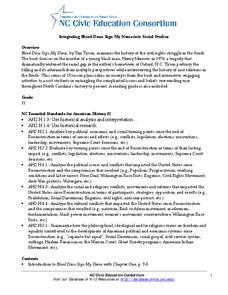Building Evidence-Based Arguments: Grade 9
New ReviewHigh schoolers investigate the dilemma of a proportional response with a lesson about the history of terrorism and militant extremists in the United States. As they examine memos from the FBI and speeches from President Bush and Obama,...
K20 Learn
Filling Our Land with Landfills: Solid Waste Disposal
New ReviewThough it comprises only 5 percent of the world's population, the US generates 40 percent of the world's waste. Scholars learn about landfills, their safety, and other solid waste methods. They use experiments and research to learn more....
K20 Learn
Blackout Poetry: Re-Envisioning Writing
New ReviewShed light on the beauty of language with a great poetry activity. After learning about Austin Kleon's blackout poetry model, pupils respond to some of his poetry and use it as a model to produce their own. Young writers also share their...
Odell Education
Making Evidence-Based Claims: Grade 8
New ReviewAmerican women have been working toward equal rights since the ink dried on the Declaration of Independence. Focused on the words and actions of Sojourner Truth, Shirley Chisholm, and Venus Williams, a language arts lesson takes eighth...
Carolina K-12
Causes of the American Revolution
Beginning with the experience of hearing that lockers in school will be taxed, through analysis of political cartoons and informational text, and culminating in a debate between loyalists and patriots, your class members will engage in a...
Carolina K-12
On the Road to Revolution: Creating a Living Timeline
Divided into nine topic groups, from the Proclamation of 1763 to the Battles of Lexington and Concord, your young historians research significant events on the road to the American Revolution, then create a two- to three-minute sketch...
Carolina K-12
Plessy v. Ferguson & the Roots of Segregation
How far in the past do the roots of Jim Crow and segregation extend? Young historians closely consider this question using detailed PowerPoint slides as a basis for discussion rather than lecture, culminating in an activity where class...
Carolina K-12
Factors of Production and Economic Decision-Making
Class members begin this engaging economics activity by listing all the resources used in producing a car and using that example to draw parallels to the four primary factors of production: capital goods, labor, natural resources, and...
Carolina K-12
What Should President Truman Do?
After reading the article Choices: Truman, Hirohito, and the Atomic Bomb, class members engage in a simulation, assume the role of President Truman or one of his advisors and discuss the options open to the president. The exercise...
Carolina K-12
Trench Warfare in World War I
Class members engage in an experiential activity and research topics related to the exercise to gain a deeper understanding of the conditions in the trenches during World War I. A potent and thought-provoking activity.
Carolina K-12
The Major Conferences of World War II
Young historians create a 1940's news radio broadcast on the five major World War II conferences, including the Atlantic, Casablanca, Tehran, Yalta, and Potsdam.
Center for Literacy and Disability Studies
The Bill of Rights
Explore the Bill of Rights in-depth with this resource packet that includes the complete text of the document, scenarios and discussion questions for each amendment, role-playing activities, exercises, questions for a Socratic seminar, a...
Carolina K-12
The Vietnam War and Protest Music
Here's a must-have resource for your Vietnam War curriculum file. Class members view a PowerPoint that details the background of the conflict and then examines the reasons for and the effects of protest songs on American attitudes toward...
Winnipeg School Division Numeracy Project
Dot Card and Ten Frame Activities
What fun, simple number value activities these are! Using dot cards and ten frames, 34 educational games are briefly described to help diversify these great strategies. For example, in the game "I Wish I Had..." the teacher holds up a...
Carolina K-12
Comparing Economic Systems
How do people make decisions in a world where wants are unlimited but resources are not? How do individuals and governments utilize scarce resources (human, natural, and capital) in different economic systems? Introduce your learners to...
University of North Carolina
Sitting Down To Stand Up For Democracy
Boycotts and bus rides, sit-ins and speeches. The focus of this amazing resource is on those people who were willing to put themselves at risk to take a stand for their belief in equal rights for all. A must-have for your curriculum...
University of North Carolina
The Narrative of the Life of Frederick Douglass, an American Slave
After reading excerpts from Frederick Douglass' autobiography, pupils will draw on what they've learned about the cruelty of slavery to write and present an anti-slavery speech or editorial.
University of North Carolina
Presidential Decisions During the Vietnam War
To begin a study of the Vietnam War, groups assume the role of a US president, examine primary source documents, and based on this limited information, must decide on the United States' actions during the Vietnam War.
University of North Carolina
Integrating Blood Done Sign My Name into Social Studies
Tim Tyson's Blood Done Sign My Name is the anchor text in a unit study of the history of race relations and the civil rights struggle in the South. The 11 lessons are richly detailed, and the unit deserves a space in your curriculum...
University of Minnesota
Chemotaxis Using C. elegans
Have you ever wondered what roundworms are like? Or what they don't like? Explore the sensory preferences of C. elegans through this controlled chemotaxis experiment. Biology class members brainstorm what substances might attract—or...
Core Knowledge Foundation
Unit 9: The Science of Breakable Things by Tae Keller
A novel study examines The Science of Breakable Things by Tae Keller. Fifth graders participate in daily readings, discussions, and assignments following an "ask, explore, imagine, observe, and understand" routine. A final performance...
Core Knowledge Foundation
Unit 8: Native Americans
Over five weeks, fifth graders listen to and discuss reading passages that explore the connection between Native Americans and nature. Following daily readings, scholars practice word work, including prefixes, root words, suffixes,...
Core Knowledge Foundation
Unit 7: Poetry
Over the course of a 12-lesson language arts unit, young scholars analyze a variety of poems taking a close look at figurative language and tone. They learn to compare and contrast, improve comprehension, and identify settings. To...
Core Knowledge Foundation
Unit 6: The Reformation
Over three weeks, fifth graders read about and discuss the Reformation which saw religion and politics shift across Europe. Following daily readings, young scholars practice spelling, grammar, and morphology skills such as prefixes,...



